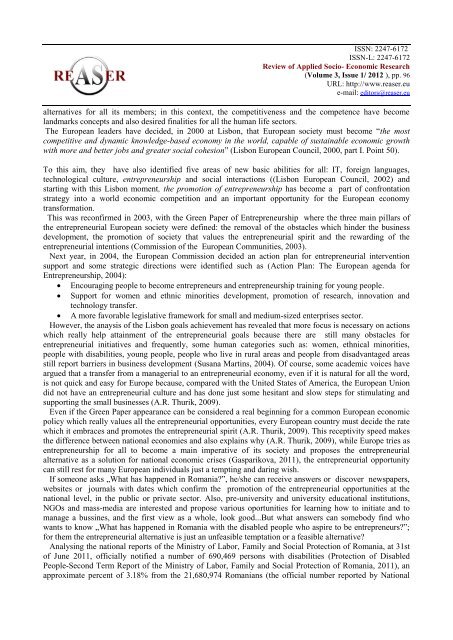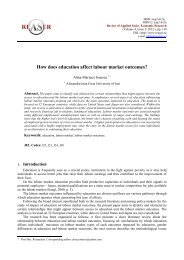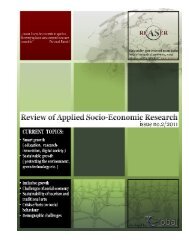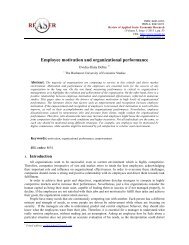Volume 3, ISSUE1/2012 - Review of Applied Socio-Economic ...
Volume 3, ISSUE1/2012 - Review of Applied Socio-Economic ...
Volume 3, ISSUE1/2012 - Review of Applied Socio-Economic ...
You also want an ePaper? Increase the reach of your titles
YUMPU automatically turns print PDFs into web optimized ePapers that Google loves.
ISSN: 2247-6172<br />
ISSN-L: 2247-6172<br />
<strong>Review</strong> <strong>of</strong> <strong>Applied</strong> <strong>Socio</strong>- <strong>Economic</strong> Research<br />
(<strong>Volume</strong> 3, Issue 1/ <strong>2012</strong> ), pp. 96<br />
URL: http://www.reaser.eu<br />
e-mail: editors@reaser.eu<br />
alternatives for all its members; in this context, the competitiveness and the competence have become<br />
landmarks concepts and also desired finalities for all the human life sectors.<br />
The European leaders have decided, in 2000 at Lisbon, that European society must become “the most<br />
competitive and dynamic knowledge-based economy in the world, capable <strong>of</strong> sustainable economic growth<br />
with more and better jobs and greater social cohesion” (Lisbon European Council, 2000, part I. Point 50).<br />
To this aim, they have also identified five areas <strong>of</strong> new basic abilities for all: IT, foreign languages,<br />
technological culture, entrepreneurship and social interactions ((Lisbon European Council, 2002) and<br />
starting with this Lisbon moment, the promotion <strong>of</strong> entrepreneurship has become a part <strong>of</strong> confrontation<br />
strategy into a world economic competition and an important opportunity for the European economy<br />
transformation.<br />
This was reconfirmed in 2003, with the Green Paper <strong>of</strong> Entrepreneurship where the three main pillars <strong>of</strong><br />
the entrepreneurial European society were defined: the removal <strong>of</strong> the obstacles which hinder the business<br />
development, the promotion <strong>of</strong> society that values the entrepreneurial spirit and the rewarding <strong>of</strong> the<br />
entrepreneurial intentions (Commission <strong>of</strong> the European Communities, 2003).<br />
Next year, in 2004, the European Commission decided an action plan for entrepreneurial intervention<br />
support and some strategic directions were identified such as (Action Plan: The European agenda for<br />
Entrepreneurship, 2004):<br />
Encouraging people to become entrepreneurs and entrepreneurship training for young people.<br />
Support for women and ethnic minorities development, promotion <strong>of</strong> research, innovation and<br />
technology transfer.<br />
A more favorable legislative framework for small and medium-sized enterprises sector.<br />
However, the anaysis <strong>of</strong> the Lisbon goals achievement has revealed that more focus is necessary on actions<br />
which really help attainment <strong>of</strong> the entrepreneurial goals because there are still many obstacles for<br />
entrepreneurial initiatives and frequently, some human categories such as: women, ethnical minorities,<br />
people with disabilities, young people, people who live in rural areas and people from disadvantaged areas<br />
still report barriers in business development (Susana Martins, 2004). Of course, some academic voices have<br />
argued that a transfer from a managerial to an entrepreneurial economy, even if it is natural for all the word,<br />
is not quick and easy for Europe because, compared with the United States <strong>of</strong> America, the European Union<br />
did not have an entrepreneurial culture and has done just some hesitant and slow steps for stimulating and<br />
supporting the small businesses (A.R. Thurik, 2009).<br />
Even if the Green Paper appearance can be considered a real beginning for a common European economic<br />
policy which really values all the entrepreneurial opportunities, every European country must decide the rate<br />
which it embraces and promotes the entrepreneurial spirit (A.R. Thurik, 2009). This receptivity speed makes<br />
the difference between national economies and also explains why (A.R. Thurik, 2009), while Europe tries as<br />
entrepreneurship for all to become a main imperative <strong>of</strong> its society and proposes the entrepreneurial<br />
alternative as a solution for national economic crises (Gasparikova, 2011), the entrepreneurial opportunity<br />
can still rest for many European individuals just a tempting and daring wish.<br />
If someone asks „What has happened in Romania?”, he/she can receive answers or discover newspapers,<br />
websites or journals with dates which confirm the promotion <strong>of</strong> the entrepreneurial opportunities at the<br />
national level, in the public or private sector. Also, pre-university and university educational institutions,<br />
NGOs and mass-media are interested and propose various oportunities for learning how to initiate and to<br />
manage a bussines, and the first view as a whole, look good...But what answers can somebody find who<br />
wants to know „What has happened in Romania with the disabled people who aspire to be entrepreneurs?”;<br />
for them the entrepreneurial alternative is just an unfeasible temptation or a feasible alternative?<br />
Analysing the national reports <strong>of</strong> the Ministry <strong>of</strong> Labor, Family and Social Protection <strong>of</strong> Romania, at 31st<br />
<strong>of</strong> June 2011, <strong>of</strong>ficially notified a number <strong>of</strong> 690,469 persons with disabilities (Protection <strong>of</strong> Disabled<br />
People-Second Term Report <strong>of</strong> the Ministry <strong>of</strong> Labor, Family and Social Protection <strong>of</strong> Romania, 2011), an<br />
approximate percent <strong>of</strong> 3.18% from the 21,680,974 Romanians (the <strong>of</strong>ficial number reported by National








